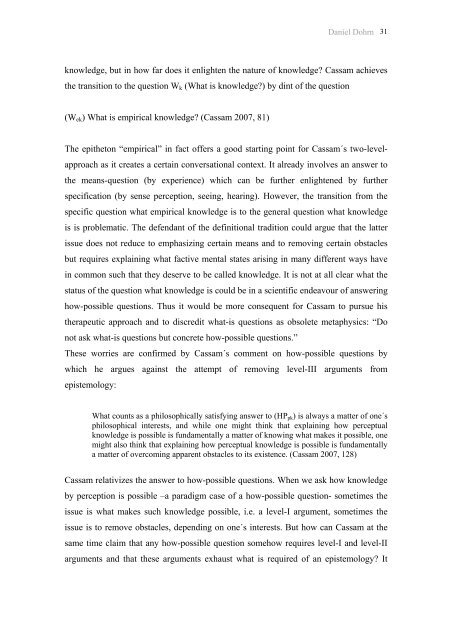Complete Issue in PDF - Abstracta
Complete Issue in PDF - Abstracta
Complete Issue in PDF - Abstracta
You also want an ePaper? Increase the reach of your titles
YUMPU automatically turns print PDFs into web optimized ePapers that Google loves.
Daniel Dohrn 31<br />
knowledge, but <strong>in</strong> how far does it enlighten the nature of knowledge? Cassam achieves<br />
the transition to the question Wk (What is knowledge?) by d<strong>in</strong>t of the question<br />
(Wek) What is empirical knowledge? (Cassam 2007, 81)<br />
The epitheton “empirical” <strong>in</strong> fact offers a good start<strong>in</strong>g po<strong>in</strong>t for Cassam´s two-levelapproach<br />
as it creates a certa<strong>in</strong> conversational context. It already <strong>in</strong>volves an answer to<br />
the means-question (by experience) which can be further enlightened by further<br />
specification (by sense perception, see<strong>in</strong>g, hear<strong>in</strong>g). However, the transition from the<br />
specific question what empirical knowledge is to the general question what knowledge<br />
is is problematic. The defendant of the def<strong>in</strong>itional tradition could argue that the latter<br />
issue does not reduce to emphasiz<strong>in</strong>g certa<strong>in</strong> means and to remov<strong>in</strong>g certa<strong>in</strong> obstacles<br />
but requires expla<strong>in</strong><strong>in</strong>g what factive mental states aris<strong>in</strong>g <strong>in</strong> many different ways have<br />
<strong>in</strong> common such that they deserve to be called knowledge. It is not at all clear what the<br />
status of the question what knowledge is could be <strong>in</strong> a scientific endeavour of answer<strong>in</strong>g<br />
how-possible questions. Thus it would be more consequent for Cassam to pursue his<br />
therapeutic approach and to discredit what-is questions as obsolete metaphysics: “Do<br />
not ask what-is questions but concrete how-possible questions.”<br />
These worries are confirmed by Cassam´s comment on how-possible questions by<br />
which he argues aga<strong>in</strong>st the attempt of remov<strong>in</strong>g level-III arguments from<br />
epistemology:<br />
What counts as a philosophically satisfy<strong>in</strong>g answer to (HPpk) is always a matter of one´s<br />
philosophical <strong>in</strong>terests, and while one might th<strong>in</strong>k that expla<strong>in</strong><strong>in</strong>g how perceptual<br />
knowledge is possible is fundamentally a matter of know<strong>in</strong>g what makes it possible, one<br />
might also th<strong>in</strong>k that expla<strong>in</strong><strong>in</strong>g how perceptual knowledge is possible is fundamentally<br />
a matter of overcom<strong>in</strong>g apparent obstacles to its existence. (Cassam 2007, 128)<br />
Cassam relativizes the answer to how-possible questions. When we ask how knowledge<br />
by perception is possible –a paradigm case of a how-possible question- sometimes the<br />
issue is what makes such knowledge possible, i.e. a level-I argument, sometimes the<br />
issue is to remove obstacles, depend<strong>in</strong>g on one´s <strong>in</strong>terests. But how can Cassam at the<br />
same time claim that any how-possible question somehow requires level-I and level-II<br />
arguments and that these arguments exhaust what is required of an epistemology? It




